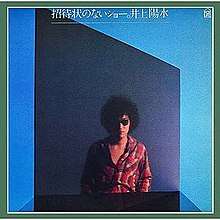Shōtaijō no Nai Show
Shōtaijō no Nai Show (招待状のないショー) is the fifth studio album by Japanese singer-songwriter Yosui Inoue, issued in March 1976. It was the first long-play record he released under the For Life Records, a record label that he joined as one of the co-founders and started in 1975.
| Shōtaijō no Nai Show | ||||
|---|---|---|---|---|
 | ||||
| Studio album by | ||||
| Released | March 25, 1976 | |||
| Genre | Folk rock | |||
| Length | 48:35 | |||
| Label | For Life | |||
| Producer | Yōsui Inoue | |||
| Yōsui Inoue chronology | ||||
| ||||
Track listing
All songs written and composed by Yōsui Inoue, except where indicated
Side one
- "Good, Good-Bye" – 3:37
- "Shōtaijō no Nai Show (招待状のないショー)" – 3:43
- "Makurakotoba (枕詞)" – 1:56
- "Aozora, Hitorikiri (青空、ひとりきり)" – 4:38
- "Summer" – 3:38
- "Magarikado (曲り角)" – 4:38
- "Kotoshi wa (今年は)" – 438
Side two
- "Minazuki no Yoru (水無月の夜)" – 4:39
- "Sakamichi (坂道)" (Inoue, Kei Ogura) – 3:22
- "Kuchibue (口笛)" – 3:02
- "I-Shi no Kekkon (I氏の結婚)" – 2:54
- "Mō...... (もう......)" – 3:45
- "Musubikotoba (結詞)" – 6:21
Personnel
- Yōsui Inoue – Acoustic guitar, electric guitar, electric bass, backing vocals
- Hiromi Yasuda – Acoustic guitar
- Hirofumi Tokutake – Electric guitar
- Masayoshi Takanaka – Electric guitar, acoustic guitar
- Mitsuo Nagai – Electric guitar, flat mandolin
- Kazuo Shiina – Electric guitar
- Hirokuni Korekata (occasionally credited to Kunihiro Korekata) – Electric guitar
- Kenji Ōmura – Electric guitar
- Shigeru Suzuki – 12-string guitar
- Hirobumi Suzuki – Electric bass
- Toru Hirano – Electric bass
- Tsugutoshi Goto – Electric bass
- Rei Ohara – Electric bass
- Hiroki Komazawa – Steel guitar
- Kunimitsu Inaba – Wood bass
- Masahiro Takekawa – Violin
- Takayoshi Watanabe – Keyboards
- Shigehito Ōhara – Piano
- Masaru Imada – Electric piano
- Jun Fukamachi – Electric piano
- Akiko Yano – Keyboards, backing vocals
- Makoto Yano – Keyboards, electric piano, rhythm box, percussion
- Ichiro Maeda – Keyboards, percussion, rhythm box
- Katz Hoshi – Percussion, backing vocals
- Shuichi Murakami – Drums
- Tatsuo Hayashi – Drums
- Tetsurō Kashibuchi – Drums
- Motoya Hamaguchi – Percussion
- Sancho Nanoha – Percussion
- Nobuo Saito – Percussion
- Fujio Saito – Percussion
- Yukiko Nishizawa – Ocarina
- Sumio Okada – Horn
- Kouji Hatori – Horn
- Kinji Yoshino – 6th
Chart positions
Album
| Year | Album | Country | Chart | Position | Weeks | Sales |
|---|---|---|---|---|---|---|
| 1976 | Shoutaijou no Nai Show | Japan | Oricon Weekly LP Albums Chart (top 100)[1] | 1 | 35 | 323,000+ |
| Oricon Weekly CT Albums Chart (top 100)[1] | 1 | 30 | ||||
Singles
| Year | Single | B-Side | Chart | Position | Weeks | Sales |
|---|---|---|---|---|---|---|
| 1975 | "Aozora, Hitorikiri" | "Flight" | Japanese Oricon Weekly (top 100)[2] | 8 | 17 | 255,000 |
| 1976 | "Good, Good-Bye" [Edit] | "Kodomo e no Uta" | 13 | 14 | 149,000 | |
Release history
| Country | Date | Label | Format | Catalog number | Notes |
|---|---|---|---|---|---|
| Japan | March 25, 1976 | For Life Records | LP | FLL4002 | |
| Audio cassette | 28K13 | ||||
| August 21, 1985 | CD | 35KD16 | |||
| February 21, 1990 | FLCF-29028 | ||||
| September 18, 1992 | Audio cassette | FLTF-28034 | |||
| CD | FLCF-29168 | ||||
| May 30, 2001 | FLCF-3848 | Original recording digitally remastered | |||
| March 25, 2009 | For Life Music Entertainment/BMG | SHM-CD | FLCF-5001 | 2001 Digital remaster |
gollark: I like how it does async IO internally but in a nice way without magic async/await keywords sprinkled everywhere, yes.
gollark: And yet its channels are actually SUBOPTIMAL in SOME SCENARIOS?!
gollark: If I've learned anything from this, it's to avoid triangle grids since hexagons have much more elegant indexing.
gollark: I did the first thing and one of the written questions there (but not the one which wasn't doable by computer since I have no idea how that can actually be answered), and spent ages working out how to implement the second but ran out of time.
gollark: [REDACTED]
References
- "Yosui Inoue Oricon Albums Chart listings" (in Japanese). Archived from Yamachan Land (Japan's charts archives) – Albums Chart Daijiten – the original Check
|url=value (help) on 2007-06-19. Retrieved 2008-03-19. - "Yōsui Inoue Oricon Singles Chart listings" (in Japanese). Archived from Yamachan Land (Japan's charts archives) – Singles Chart Daijiten – the original Check
|url=value (help) on 2007-10-16. Retrieved 2008-03-19.
This article is issued from Wikipedia. The text is licensed under Creative Commons - Attribution - Sharealike. Additional terms may apply for the media files.